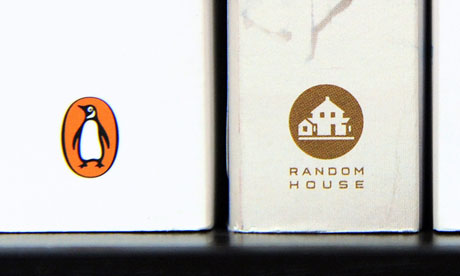
Readers rarely take much notice of imprints, but Penguin is different, writes Ian Jack. Photograph: ANDY RAIN/EPA
Letters arrive by email from two publishers, promising me that things can only get better. Andrew Phillips, the chief executive of Penguin India, writes to say that the intended partnership between Penguin and Random House would "combine the strengths of both companies" while at the same time maintaining the distinctive character of the imprints that shelter under the umbrella of each. Gail Rebuck, Random House's chief executive, hopes I'll be "excited by the news that we are seeking to combine … two of the world's leading English-language publishers … in a new home that continues to foster creativity, where our imprints will continue to enjoy independence, and our publishers and editors the freedom to decide which books to publish and how best to publish them".
Both letters use a favourite publishing word: passionate. Rebuck even refers to the prospective amalgamation as a "bold, innovative and passionate move". I don't want to carp; it's very good of these publishers to take the trouble to reassure authors as commercially insignificant as I am. "Passionate" looks like an adjective too far, however, to describe a plan that aims to defend traditional trade publishing from digital competition, particularly Amazon's, by cutting the costs of the mechanics – production, warehousing, shipping, accounting – and spending more on marketing and publicity. Like many modern restructurings, including those of the NHS and the police, it promises to preserve and even enhance the frontline while letting synergies take their axe to "back-office" operations the customer never sees and rarely understands (though, in the case of public institutions, may sorely miss, eventually).
The frontline, in the author's case, is the imprint. Every imprint has an editorial director, one or two assistants and at least a share of a marketing person and a PR. They will get the author's book into shape and then try to sell it, and the author may be pleased that his name on the cover is linked with another even more lustrous, such as Jonathan Cape or Chatto & Windus. Readers, however, barely notice the publisher's name. What interests them is subject, author and title. They don't say, "Oh, I see that's published by Heinemann, it must be right up my street". Big outfits such as Random preserve the names of the smaller publishers they have acquired for other reasons: because the relationship between author and publisher can flourish at this more intimate scale, and because publishing houses don't want to look too monolithic.
The names of many dead entrepreneurs survive as a result. Jonathan Cape, the go-ahead book salesman who was lucky or clever enough to hire Edward Garnett as his reader and talent-spotter; Andrew Chatto, who impressed writers such as Robert Louis Stevenson with his straight talk about money; Hamish Hamilton, who won an Olympic silver in rowing and had impressive social connections that fed a snobbish taste in authorship. It would be hard to say that their book-lists had a noticeable identity. They were just as eclectic as the great family dynasties – the Routledges, the Longmans, the Collinses and the Macmillans. The Collins family made a fortune from its "Clear-Type" bibles and liturgies – "Satan trembles when he sees / Bibles sold as cheap as these" went the sales jingle – but they also published novelists as various as Winifred Holtby, Alistair MacLean and Boris Pasternak.
When, in the 1980s, the British book trade began its march towards foreign ownership, nobody could complain too much about cultural loss. Random House, then a US firm, acquired Cape, Chatto, Virago and Bodley Head in 1987, Century Hutchinson in 1989 and Secker & Warburg and Heinemann eight years later. The imprints persisted – some might say flourished – under corporate ownership. Then, in 1998, Random House was itself acquired by Bertelsmann, the German media conglomerate. Another big German company, the Holtzbrinck Publishing Group, bought Macmillan around the same time, while in 2004 the French multinational Hachette took control of several imprints, including John Murray, Hodder, Orion and Little, Brown. When Penguin merges with Random/Bertelsmann, British-owned general publishers, led by Bloomsbury and Faber, will have no more than 7% of the market.
Does it matter to the reading public? It doesn't seem to have done so far – we never knew who Secker & Warburg were anyway. But Penguin is different. No other imprint in the world has meant so much to its readers – to the point where at one time, the penguin colophon was as big a recommendation as the author's name. It was "the first serious attempt to introduce 'branded goods' to the books trade", wrote Edward Young, the artist who drew the penguin from life at London zoo, and it was a glorious success from the start. By 1936, a year after the first Penguin appeared, a million were in print, all of them sixpenny paperbacks with the strikingly simple covers that now decorate coffee mugs and tea towels. Penguins marked their owners out as political progressives as well as cultural self-improvers. As early as 1937, Lane appointed an Indian nationalist, VK Krishna Menon, as a founding editor of the non-fiction Pelican series. "We had a kind of code," wrote Richard Hoggart of his wartime career, "that if there was a Penguin or Pelican sticking out of the back trouser-pocket of a battledress, you had a word with [the soldier] because it meant he was one of the different ones."
More at The Guardian
Both letters use a favourite publishing word: passionate. Rebuck even refers to the prospective amalgamation as a "bold, innovative and passionate move". I don't want to carp; it's very good of these publishers to take the trouble to reassure authors as commercially insignificant as I am. "Passionate" looks like an adjective too far, however, to describe a plan that aims to defend traditional trade publishing from digital competition, particularly Amazon's, by cutting the costs of the mechanics – production, warehousing, shipping, accounting – and spending more on marketing and publicity. Like many modern restructurings, including those of the NHS and the police, it promises to preserve and even enhance the frontline while letting synergies take their axe to "back-office" operations the customer never sees and rarely understands (though, in the case of public institutions, may sorely miss, eventually).
The frontline, in the author's case, is the imprint. Every imprint has an editorial director, one or two assistants and at least a share of a marketing person and a PR. They will get the author's book into shape and then try to sell it, and the author may be pleased that his name on the cover is linked with another even more lustrous, such as Jonathan Cape or Chatto & Windus. Readers, however, barely notice the publisher's name. What interests them is subject, author and title. They don't say, "Oh, I see that's published by Heinemann, it must be right up my street". Big outfits such as Random preserve the names of the smaller publishers they have acquired for other reasons: because the relationship between author and publisher can flourish at this more intimate scale, and because publishing houses don't want to look too monolithic.
The names of many dead entrepreneurs survive as a result. Jonathan Cape, the go-ahead book salesman who was lucky or clever enough to hire Edward Garnett as his reader and talent-spotter; Andrew Chatto, who impressed writers such as Robert Louis Stevenson with his straight talk about money; Hamish Hamilton, who won an Olympic silver in rowing and had impressive social connections that fed a snobbish taste in authorship. It would be hard to say that their book-lists had a noticeable identity. They were just as eclectic as the great family dynasties – the Routledges, the Longmans, the Collinses and the Macmillans. The Collins family made a fortune from its "Clear-Type" bibles and liturgies – "Satan trembles when he sees / Bibles sold as cheap as these" went the sales jingle – but they also published novelists as various as Winifred Holtby, Alistair MacLean and Boris Pasternak.
When, in the 1980s, the British book trade began its march towards foreign ownership, nobody could complain too much about cultural loss. Random House, then a US firm, acquired Cape, Chatto, Virago and Bodley Head in 1987, Century Hutchinson in 1989 and Secker & Warburg and Heinemann eight years later. The imprints persisted – some might say flourished – under corporate ownership. Then, in 1998, Random House was itself acquired by Bertelsmann, the German media conglomerate. Another big German company, the Holtzbrinck Publishing Group, bought Macmillan around the same time, while in 2004 the French multinational Hachette took control of several imprints, including John Murray, Hodder, Orion and Little, Brown. When Penguin merges with Random/Bertelsmann, British-owned general publishers, led by Bloomsbury and Faber, will have no more than 7% of the market.
Does it matter to the reading public? It doesn't seem to have done so far – we never knew who Secker & Warburg were anyway. But Penguin is different. No other imprint in the world has meant so much to its readers – to the point where at one time, the penguin colophon was as big a recommendation as the author's name. It was "the first serious attempt to introduce 'branded goods' to the books trade", wrote Edward Young, the artist who drew the penguin from life at London zoo, and it was a glorious success from the start. By 1936, a year after the first Penguin appeared, a million were in print, all of them sixpenny paperbacks with the strikingly simple covers that now decorate coffee mugs and tea towels. Penguins marked their owners out as political progressives as well as cultural self-improvers. As early as 1937, Lane appointed an Indian nationalist, VK Krishna Menon, as a founding editor of the non-fiction Pelican series. "We had a kind of code," wrote Richard Hoggart of his wartime career, "that if there was a Penguin or Pelican sticking out of the back trouser-pocket of a battledress, you had a word with [the soldier] because it meant he was one of the different ones."
More at The Guardian

No comments:
Post a Comment